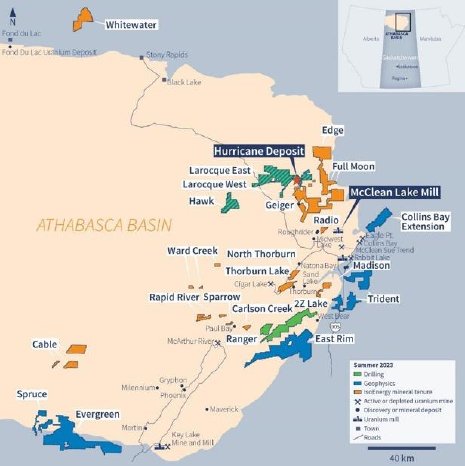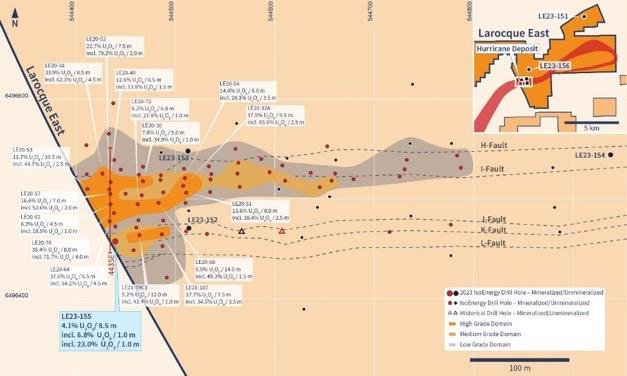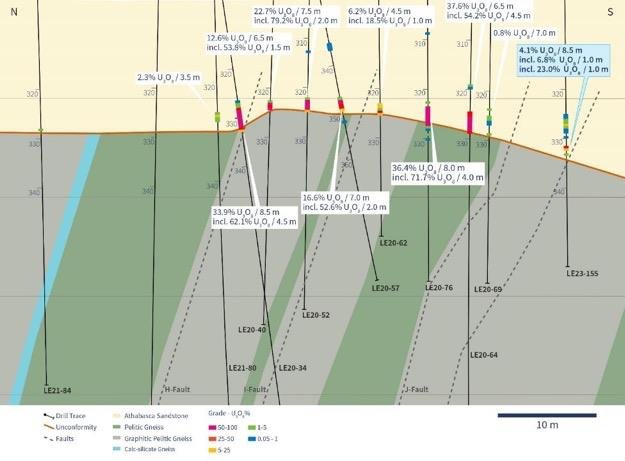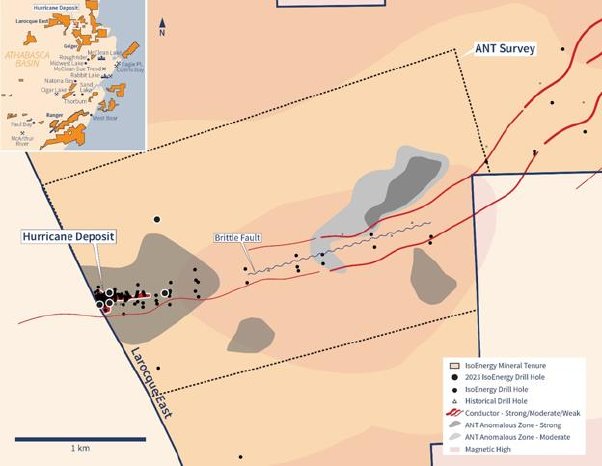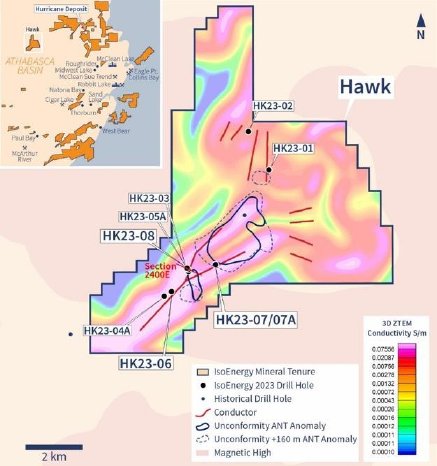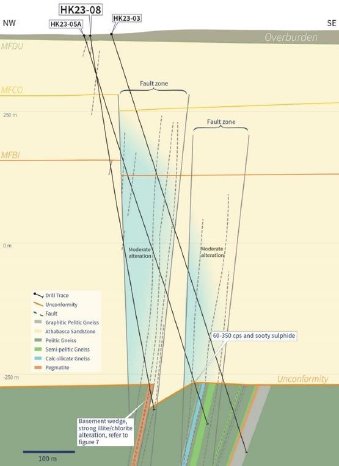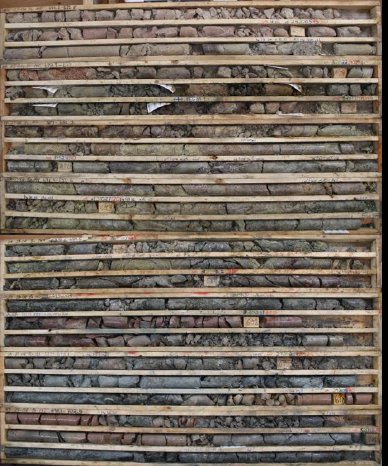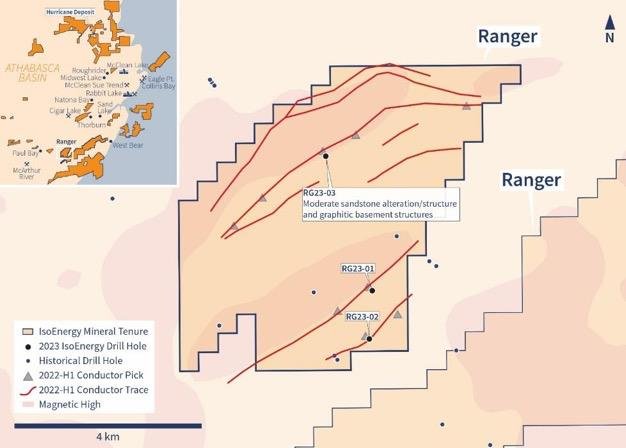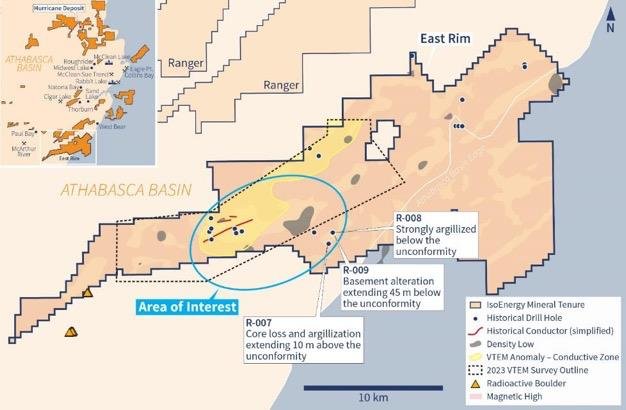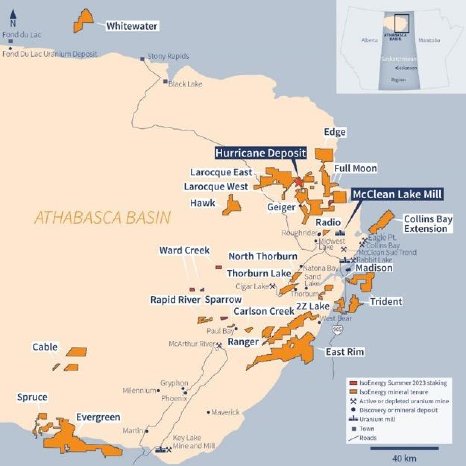Summer Program Highlights:
- 5,270 metres of drilling were completed in 11 drill holes on the Larocque East, Hawk and Ranger projects. Mineralization was intersected in the west end of the Hurricane deposit at Larocque East, and prospective intervals of strong structural disruption, clay alteration and desilicification were intersected on conductive corridors with significant untested strike length at Hawk and Ranger.
- At Laroque East, Drill hole LE23-155, drilled in the southwest portion of the Hurricane deposit to upgrade confidence in continuity of mineralization to the western border of the property, intersected 5 meters averaging 4.1% U3O8 between 325.0 and 333.5m downhole. This interval includes an intercept of 6.8% U3O8 over a 1.0 m interval from 327.0 to 328.0m and a higher-grade interval of 23% U3O8 over 1.0 m from 331.5 to 332.5m.
- Innovative Ambient Noise Tomography (ANT) surveys were completed on the Larocque East, Hawk and East Rim projects in collaboration with FLEET. A significant low velocity response, interpreted to represent alteration, is spatially associated with the Hurricane deposit and 3D models from these surveys will be integrated with other drill hole and geophysical information to generate targets for future drilling. A compelling 1-kilometre-long ANT target has been defined along strike of the Hurricane deposit with the same footprint as the feature associated with Hurricane.
- Drill hole HK23-08 at Hawk, intersected a significant fault zone that offsets the unconformity by 16.5 metres and is spatially associated with strong illite and chlorite alteration, and desilicification in the lower sandstone and upper basement. HK23-08 was drilled 850 metres south of a 2-kilometre-long ANT velocity anomaly that is situated within a north-northeast trending regional corridor defined by a magnetic low and coincident ZTEM conductivity.
- A helicopter-borne Versatile Time Domain Electromagnetic (VTEM™ Plus) survey flown at the East Rim project, on the southeast edge of the Athabasca Basin, defined a strong conductivity trend interpreted to represent prospective graphitic basement host rocks.
- Airborne geophysical surveying was also completed at the Trident, Collins Bay Extension and Evergreen projects to further develop a pipeline of high-quality drill targets.
Dr. Darryl Clark, Vice President, Exploration also commented: “During the summer field season, we advanced several of our projects through the discovery and development pipeline. At our flagship Hurricane project, in addition to successfully extending the resource footprint to the west, the team generated several new exploration targets to the east. We also successfully deployed the innovative ANT geophysical system at Hurricane, over the ore zone and the north, south and east extents. Preliminary analysis of the results illustrates that we can detect the unique hydrothermal alteration system that surrounds the ore deposit, therefore we can use this information to look for similar features in the surveys that we have completed to the east of Hurricane deposit as well as at our high priority Hawk exploration project. The results from drilling at Hawk confirmed the presence of a significant late brittle fault zone associated with an unconformity offset, alteration, and elevated radioactivity. This feature, combined with the well-defined ANT anomaly located 850 metres along trend to the north, is a compelling target that will be drill tested in the coming months.”
Summer Exploration Results
Hurricane, Larocque East Project
Six drill holes totalling, 2,175 metres were completed at Larocque East (Figure 2). Four holes were dedicated to expansion of Hurricane. Drill hole LE23-155 targeted the unconformity 26.5 meters west of drill hole LE21-78c1 and intersected 8.5 meters averaging 4.1% U3O8 between 325.0 to 333.5m downhole, which includes an intercept of 6.8% U3O8 over a 1.0 m interval from 327.0 to 328.0m and includes a higher-grade interval of 23% U3O8 over 1.0 m from 331.5 to 332.5m (Table 1 and Figure 3). Additionally, a single hole was completed to test resistivity targets north of Hurricane. The drill hole added valuable knowledge in understanding the geology of the project area.
The preliminary results of the ANT survey conducted over Hurricane and the surrounding area successfully outlined a consistent low velocity feature that overlaps with the drill defined alteration halo spatially associated with the Hurricane deposit (Figure 4). Furthermore, the ANT survey also highlighted several other areas with a similar low velocity signature to the Hurricane deposit alteration halo. One of these is along strike east of the deposit on the same conductor corridor and has roughly the same footprint as the low velocity feature associated with the Hurricane deposit. Drilling in 2024 will follow up ANT results integrated with other geophysical and drill hole information.
Hawk Project
Drilling at Hawk totaled 1,796 metres and tested electromagnetic conductors identified in the 2022/2023 geophysical surveys. Summer drilling comprised two holes that were completed to target and two holes that encountered poor ground conditions in the upper sandstone cover sequence and had to be abandoned as a result (Figure 5), leaving a highly prospective untested target that will be tested during a future drill program. Drilling successfully intersected prospective brittle structures and alteration in hole HK23-08. The basal sandstone in hole HK23-08 is moderately bleached with metre-scale zones of desilicification and illite/chlorite clay alteration that are associated with structure (Figure 6). A broken and illite/chlorite clay altered fault zone was intersected in the basement from 691 to 707 m downhole. The unconformity surface is offset by this fault zone, and a sandstone wedge is present within the fault zone between 691 and 693 meters (Figure 7). There is a ~16.5 metre west-side-up reverse component of displacement of the unconformity.
In addition to exploration drilling, an ANT survey was conducted over 7.3 km of the main north-northeast trending ZTEM conductivity corridor and has defined a large velocity low anomaly (Figure 5) that is coincident with both the on strike projection of the altered brittle fault zone intersected in drill holes HK23-03/05A/08 and the strong conductor picks identified in the winter 2023 ground EM survey (IsoEnergy Ltd News Release April, 2023). Similar to the ANT signature that is associated with the Hurricane deposit, the velocity low is interpreted as the result of a large hydrothermal system that has altered the sandstone cover sequence above the unconformity target.
Ranger Project
IsoEnergy completed three diamond drill holes totaling 1,299 metres in the first IsoEnergy drilling program on the Ranger property (Figure 8). RG23-01 and RG23-02 were targeted to follow up results from 1994 Cameco drillholes along the Bird Lake Fault. RG23-03 was targeted to test an un-drilled conductor identified by the winter 2022 Fixed Loop Transient Electromagnetic (FLTEM) survey carried out by IsoEnergy in winter 2022.
RG23-03 intersected zones of strong bleaching, structure-hosted clay alteration, and pyrite-rich fracture linings in the sandstone, along with moderate illite straddling the unconformity. Discrete graphitic structures were intersected from 483.1 to 490.7m associated with 13.3 parts per million uranium by ICPMS partial digestion from 480.0 to 485.0m. Results from RG23-03 warrant further drilling along the northern conductor trend.
RG23-01 and RG23-02 intersected zones of anomalous illite alteration in the sandstone immediately above the unconformity. Geological interpretation suggests further drilling is required to sufficiently test the targets in this area.
East Rim Project
Geotech Ltd conducted a helicopter-borne Versatile Time Domain Electromagnetic (VTEM™ Plus) and horizontal magnetic gradiometer geophysical survey at the East Rim project. The survey covered 1136 line-kilometres. The VTEM™ Plus system is excellent at locating discrete conductive anomalies as well as mapping lateral and vertical variations in resistivity. A conductivity domain outlined by the 2023 VTEM survey, density low anomalies identified by the 2022 Falcon gravity survey, historic ground EM conductors and alteration in historic drill holes are all present in the area of interest (Figure 9). The results of this VTEM survey will be integrated with the magnetic and gravity surveys that were conducted in 2022 to generate basement hosted targets for initial reconnaissance drill testing in 2024. Importantly, the sandstone cover on the property is thin, ranging from no sandstone cover to 265 metres in previous drilling.
Efforts at the early-stage East Rim project have continued to focus on basement-hosted targets where multiple layers of geophysical data stack and allow the Company to vector into a potential uranium mineralised system located under this thin cover.
Airborne Geophysical Surveying
In addition to the East Rim VTEM survey, airborne geophysical surveys were completed at four other projects (Figure 1) to identify prospective geological environments on these projects over which ground surveys can be focused to quickly move them to the drill ready stage.
Xcalibur Multiphysics conducted multiparameter airborne geophysical surveys at IsoEnergy’s early-stage Trident and Collins Bay Extension projects. The surveys employed Xcalibur’s FALCON® Airborne Gravity Gradiometry system to acquire high-resolution gravity, magnetic, and radiometric (spectrometry) datasets. Gravity and magnetic data will improve the property-wide understanding of basement geology and assist in the identification of potential alteration zones, while gamma ray spectrometry aims to locate anomalous radioactivity related to near-surface showings and radioactive boulder trains such as those that led to the discovery of several notable uranium deposits including Key Lake and Triple R.
Staking
Five claims, totalling 2193 hectares, were staked during the summer (Figure 10). This staking was intended to grow the existing Geiger, Full Moon, and Rapid River tenures and establish the Ward Creek property in an under-explored prospective corridor.
Corporate Update
On September 27, 2023, IsoEnergy entered into a definitive arrangement agreement for a share-for-share merger of IsoEnergy and Consolidated Uranium Inc. (“Consolidated Uranium”), pursuant to which IsoEnergy will acquire all of the issued and outstanding common shares of Consolidated Uranium by way of plan of arrangement under the Business Corporations Act (Ontario). A vote of Consolidated Uranium shareholders is anticipated to take place on or about November 28, 2023, with the transaction expected to close during December 2023 (subject to satisfaction of certain other customary conditions precedent).
In connection with the merger, on October 19, 2023 IsoEnergy completed a $36.6 million private placement of subscription receipts, with such subscription receipts automatically convertible for one IsoEnergy common share on closing of the merger. The arrangement will create a new, diversified, industry leading uranium development and exploration company of greater scale that is focused on growth in Canada, the United States and Australia.
Qualified Person Statement
The scientific and technical information contained in this news release was prepared by Darryl Clark, P.Geo., IsoEnergy’s Vice President, Exploration, who is a “Qualified Person” (as defined in NI 43-101 – Standards of Disclosure for Mineral Projects). Dr. Clark has verified the data disclosed. As mineralized drill holes at the Hurricane zone are oriented very steeply (-70 to -90 degrees) into a zone of mineralization that is interpreted to be horizontal, the true thickness of the intersections is expected to be greater than or equal to 90% of the core lengths. This news release refers to properties other than those in which the Company has an interest. Mineralization on those other properties is not necessarily indicative of mineralization on the Company’s properties. All chemical analyses are completed for the Company by SRC Geoanalytical Laboratories in Saskatoon, SK. For additional information regarding the Company’s Larocque East Project, including its quality assurance and quality control procedures, please see the Technical Report dated effective May 15, 2019, on the Company’s profile at .
About IsoEnergy
IsoEnergy is a well-funded uranium exploration and development company with a portfolio of prospective projects in the eastern Athabasca Basin in Saskatchewan, Canada. In 2018, the Company discovered the high-grade Hurricane Deposit on its 100% owned Larocque East property in the Eastern Athabasca Basin. The Hurricane Deposit has Indicated Mineral Resources of 48.61 Million lb U3O8 based on 63,800 tonnes grading 34.5% U3O8 and Inferred Mineral Resources of 2.66 Million lb U3O8 based on 54,300 tonnes grading 2.2% U3O8 (July 8, 2022). The Hurricane Deposit is 100% owned by IsoEnergy and is unencumbered from any royalties. IsoEnergy is led by a Board and Management team with a track record of success in uranium exploration, development, and operations. The Company was founded and is supported by the team at its major shareholder, NexGen Energy Ltd.
Tim Gabruch
President and Chief Executive Officer
IsoEnergy Ltd.
+1 306-261-6284
info@isoenergy.ca
www.isoenergy.ca
Investor Relations
Kin Communications
+1 604 684 6730
iso@kincommunications.com
In Europe:
Swiss Resource Capital AG
Jochen Staiger
info@resource-capital.ch
www.resource-capital.ch
Neither the TSX Venture Exchange nor its Regulations Services Provider (as that term is defined in the policies of the TSX Venture Exchange) accepts responsibility for the adequacy or accuracy of this release.
This news release shall not constitute an offer to sell or a solicitation of any offer to buy any securities, nor shall there be any sale of any securities in any jurisdiction in which such offer, solicitation or sale would be unlawful. The securities referenced herein have not been, nor will they be, registered under the United States Securities Act of 1933, as amended (the “U.S. Securities Act”), and such securities may not be offered or sold within the United States absent registration under the U.S. Securities Act or an applicable exemption from the registration requirements thereunder.
Forward-Looking Information
The information contained herein contains “forward-looking statements” within the meaning of the United States Private Securities Litigation Reform Act of 1995 and “forward-looking information” within the meaning of applicable Canadian securities legislation. “Forward-looking information” includes, but is not limited to, statements with respect to the activities, events or developments that the Company expects or anticipates will or may occur in the future, including, without limitation, planned exploration activities. Generally, but not always, forward-looking information and statements can be identified by the use of words such as “plans”, “expects”, “is expected”, “budget”, “scheduled”, “estimates”, “forecasts”, “intends”, “anticipates”, or “believes” or the negative connotation thereof or variations of such words and phrases or state that certain actions, events or results “may”, “could”, “would”, “might” or “will be taken”, “occur” or “be achieved” or the negative connotation thereof.
Such forward-looking information and statements are based on numerous assumptions, including among others, that the results of planned exploration activities are as anticipated, the price of uranium, the anticipated cost of planned exploration activities, that general business and economic conditions will not change in a material adverse manner, that financing will be available if and when needed and on reasonable terms, that third party contractors, equipment and supplies and governmental and other approvals required to conduct the Company’s planned exploration activities will be available on reasonable terms and in a timely manner. Although the assumptions made by the Company in providing forward-looking information or making forward-looking statements are considered reasonable by management at the time, there can be no assurance that such assumptions will prove to be accurate.
Forward-looking information and statements also involve known and unknown risks and uncertainties and other factors, which may cause actual events or results in future periods to differ materially from any projections of future events or results expressed or implied by such forward-looking information or statements, including, among others: negative operating cash flow and dependence on third party financing, uncertainty of additional financing, no known mineral reserves or resources, the limited operating history of the Company, the influence of a large shareholder, alternative sources of energy and uranium prices, aboriginal title and consultation issues, reliance on key management and other personnel, actual results of exploration activities being different than anticipated, changes in exploration programs based upon results, availability of third party contractors, availability of equipment and supplies, failure of equipment to operate as anticipated; accidents, effects of weather and other natural phenomena and other risks associated with the mineral exploration industry, environmental risks, changes in laws and regulations, community relations and delays in obtaining governmental or other approvals.
Although the Company has attempted to identify important factors that could cause actual results to differ materially from those contained in the forward-looking information or implied by forward-looking information, there may be other factors that cause results not to be as anticipated, estimated or intended. There can be no assurance that forward-looking information and statements will prove to be accurate, as actual results and future events could differ materially from those anticipated, estimated or intended. Accordingly, readers should not place undue reliance on forward-looking statements or information. The Company undertakes no obligation to update or reissue forward-looking information as a result of new information or events except as required by applicable securities laws.
